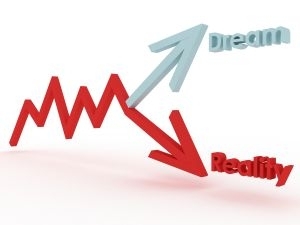| Home | About | Archives | RSS Feed |

@theMarket: Better Days Ahead
 After this week you should have either an upset stomach, stress headache or both. Human beings do not do well in markets that climb up and down by over a percent on a daily basis. Unfortunately, as this market bottoms, we may expect more of the same.
After this week you should have either an upset stomach, stress headache or both. Human beings do not do well in markets that climb up and down by over a percent on a daily basis. Unfortunately, as this market bottoms, we may expect more of the same.
On the plus side, the Greek Prime Minister George Papandreou received a parliamentary vote of confidence this week. Yet, facing investors this week is a vote on the passage of the austerity plan that the European Community demands in exchange for bailout money.
Economic data continues to disappoint with the latest unemployment figures coming in more than expected. Wherever you look, gloom and doom pervades the minds and hearts of investors. On Wednesday, Fed chief Ben Bernanke didn't help by reducing the Fed's estimate for GDP growth in the second quarter from 3.1-3.3 percent to 2.7-2.9 percent. Even a 5 percent decline in oil was viewed as negative and simply another proof that the economy is faltering.
Most investors missed the point of Thursday's release of 60 million barrels of crude from the world's strategic oil supply. Pundits complained that it was too little to impact demand since it amounted to less than a day's supply of global demand. Others argued it was an act of desperation by an administration that has run out of ideas to stimulate the economy.
It was none of the above, in my opinion. Readers may recall that a few weeks ago prices of most commodities peaked after the CME raised margin requirements for everything from energy to silver. Speculators, who had bid commodity prices up to astronomical levels, abandoned the market in droves causing prices to decline to their present levels.
Most energy experts believe that the fundamental price where supply and demand for oil are in balance is closer to $85 in barrel. But notice oil, until this week it was still trading at $100 a barrel and above, (although down from its recent peak of $112 a barrel). Clearly, there were still a lot of speculators in the market, who could go either way. It was a tipping point where there was at least a 50/50 chance that traders might try and take the price higher once more.
To me, the International Energy Agency exhibited perfect timing. With a relatively small amount of released oil, they managed to drop the price of crude by $5 a barrel and send the speculators running for the hills. It has also added another element of risk since nervous traders will now have to be looking over their shoulder in case the IEA does it again.
As for the wall of worries that beset the market, all this pessimism is part of the normal process one expects as the averages descend to a level where buyers once again appear. Today we are probably within 1-2 percent of that area, if we are not already there. To me, the math is simple: a possible 50-point decline in the weeks ahead on the S&P 500 Index versus 150-200 points of upside. The risk/reward ratio tells me to not only hold the course but to buy on weakness.
Bill Schmick is an independent investor with Berkshire Money Management. (See "About" for more information.) None of the information presented in any of these articles is intended to be and should not be construed as an endorsement of BMM or a solicitation to become a client of BMM. The reader should not assume that any strategies, or specific investments discussed are employed, bought, sold or held by BMM. Direct your inquiries to Bill at (toll free) or e-mail him at wschmick@fairpoint.net. Visit www.afewdollarsmore.com for more of Bill's insights.
| Tags: silver, oil, commodities, Greece |
@theMarket: Greece — How To Default Without Defaulting
 The European Community's solution to the Greek debt crisis has been an exercise in kicking the can down the road for well over two years. Unfortunately, this Greek Tragedy is now taking on the dimensions of a three-ring circus and taking the world's financial markets along with it.
The European Community's solution to the Greek debt crisis has been an exercise in kicking the can down the road for well over two years. Unfortunately, this Greek Tragedy is now taking on the dimensions of a three-ring circus and taking the world's financial markets along with it.
This week, the volatility in the stock markets was reminiscent of the bad old days of 2008-2009. The on-again, off-again status of Greece's promised next installment of last year's bailout package was the chief cause of concern. The money was promised to Greece, if it cut the country's deficit of $40 billion. So far that hasn't happened. The Greek population has taken to the streets once again to prevent the passage of this new austerity package while Greek's ruling party is disintegrating.
In the meantime, Germany, the money man of Europe, has been insisting that the European private sector banks with large outstanding loans to Greece also become a party to any additional bailouts of the country. Germany's Angela Merkel had been insisting that 1) European financial institutions agree to give Greece an extra seven years to repay its bonds or 2) agree to a "Vienna-style" solution of swapping their existing Greek bonds for lower interest-bearing bonds.
The problem with scheme No. 1 is that the moment the private banks are forced to take a loss on their Greek debt holdings, global credit agencies would deem Greece in default. That would set off a number of sirens simultaneously in several markets. Countries with similar problems would see their bonds plummet.
The credit default swap market (CDS) would also be shaken. The CDS is where banks go to buy insurance against default by governments or corporate entities. I would guess, for example, that it costs $2 million or more every year just to insure these banks against a Greek default. But the European Central Bank is determined that any Greek debt restructuring should not trigger such a "credit event" that would enable buyers of CDS to be compensated from swap insurance sellers.
That leaves option No. 2, a Vienna-style scheme that would involve convincing banks to voluntarily accept new Greek bonds for old bonds at much lower rates of interest. That way the banks (and their shareholders) take the hit to their balance sheets and the insurance they hold would be of no value (because they would agree to take the hit "voluntarily"). I say good luck to that plan.
Investors would be smart enough to see right through that farce. They would dump their remaining European bank shares, any debt they might hold in countries such as Spain, Portugal, Ireland, etc., and would call into question the CDS insurance market overall. If governments can engineer defaults without calling them defaults, then what good is the disaster insurance that banks pay millions for each year?
Fortunately, we only have to wait until Monday for the outcome of this latest chapter in the ongoing saga of European debt restructuring. Euro zone finance ministers are meeting in Luxembourg on Sunday and will hopefully agree on some formula or compromise with Greece. Remember too that this is only an installment not a solution. It will only push the specter of default out until September. Then we get to kick the can down the road for another three months.
I am convinced that the International Monetary Fund and the European community's response to the debt crisis of the PIGS nations won't work. Something radical such as a debt-for-equity swap, combined with a debt forgiveness plan, a la Latin America in the Eighties, will be the ultimate solution to this crisis. On Friday, Deutsche Bank CEO Josef Ackermann agreed with me. He said that simply forcing Greece to impose austerity and reduce its budget deficit won't solve the crisis; it will only force the economy to contract further. He called for the creation of a European-style Marshall Plan, referring to the massive U.S. inspired "soft" loan plan to rebuild post-World War II Germany.
As for our markets, I maintain we are close to a bottom. Whether the S&P 500 Index bottoms at 1,275, 1,250, or worst case, 1,225, investors should be looking at equities. However, this time around I don't think commodities will lead the market. Instead, I would be looking at large-cap dividend stocks, the health care and some consumer staples as possible focus areas.
Bill Schmick is an independent investor with Berkshire Money Management. (See "About" for more information.) None of the information presented in any of these articles is intended to be and should not be construed as an endorsement of BMM or a solicitation to become a client of BMM. The reader should not assume that any strategies, or specific investments discussed are employed, bought, sold or held by BMM. Direct your inquiries to Bill at (toll free) or e-mail him at wschmick@fairpoint.net. Visit www.afewdollarsmore.com for more of Bill's insights.
| Tags: Greece, PIGS, bailout, Europe |
@theMarket: Jobs Versus the Market
 The May non-farm payroll jobs report was a disappointment. So much so that investors dumped stocks, convinced that because the country only added 54,000 jobs, the economy is kaput and we all headed for economic Armageddon. Now, doesn't that sound silly?
The May non-farm payroll jobs report was a disappointment. So much so that investors dumped stocks, convinced that because the country only added 54,000 jobs, the economy is kaput and we all headed for economic Armageddon. Now, doesn't that sound silly?
Let's get real folks. We didn't lose 300,000 jobs last month, which might have justified Friday morning's sell-off. Sure, economists were looking for a job gain of 100,000 plus but why should any one be surprised that unemployment is still above 9 percent given the slow growth rate of our economy?
Since the end of the recession, quarterly GDP has been at best erratic. Beginning with the third quarter of 2009, we have experienced the following string of quarterly numbers: 1.6, 5.0, 3.7, 1.7, 2.6, 3.1, 1.8 percent. All but one of those quarters have trended well below the normal economic recovery rates associated with the end of a recession. Is it any wonder that our unemployment rate bounces around while remaining inordinately high?
The spate of negative economic numbers we have been experiencing of late, in my opinion, has much more to do with the body blow Japan has taken from its earthquake and aftermath. After all, Japan is the second largest economy in the world and the fallout from its present recession impacts everyone.
As for the markets, I believe there are similarities between the April-August period of last year and what is happening today. At that time investors were concerned that we were falling back into a double dip recession. GDP for the second quarter of 2010 had dropped to 1.7 percent from 3.7 percent, while unemployment hovered at 10 percent.
The S&P 500 Index fell by over 16 percent. It was only after the Federal Reserve Bank announced the possibility of QE II that the markets recovered in August. Now the S&P is almost 300 points higher.
Last quarter's GDP growth rate was 1.8 percent down from 3.1 percent the quarter before and unemployment is 9.1 percent, up a smidgeon from last month. Unlike last year, however, we face the "end" of QE II in less than 30 days.
Readers may recall that I discounted a double-dip recession last year. I argued that we were in a slow growth recovery and should expect erratic and conflicting economic data into the foreseeable future. As long as the housing market remains in the doldrums, so will the economy. That argument still holds. At the same time, if the economy slows further, the Fed still has our back no matter how many QEs it takes.
What investors tend to forget is that we narrowly escaped a second worldwide Depression two years ago. While politicians, investors and taxpayers alike speechify about our government's huge deficit and wasteful spending, they should stop and ask why the deficit and spending is where it is today.
As a result of the financial crisis, the deleveraging of debt in the private sector was an absolute necessity. The only way to accomplish that, without driving the world over the brink, was for the government to take on that debt (deliberately leveraging the public sector balance sheet) while, at the same time, spending as much as possible to jump start the economy.
To date, that strategy has worked, although not as perfectly as certain textbook economists might have hoped. We have averted a Depression although this last Great Recession is not like any of the recessions we have experienced since the end of WW II. It is going to take time, effort and patience to unwind the financial tangle that our banks, brokers and insurance companies have created. We are on the right track, even if our path ahead is dimly lit. Expect the track to run through peaks and valleys, make sharp turns, and accelerate at times, while coasting at others. In the meantime, stay the course.
As I write this, the markets are wrestling with 1,300 on the S&P 500 Index, the bottom end of my projected range. Could the markets fall even further? Of course, they can. If we break 1,300, the next stop would be 1,250-1,275, still not the end of the world. From top to bottom that would be an 8 percent correction, after a 300-point rally over 11 months. I'll gladly accept that kind of pullback for a chance to rally up to 1,400 or above.
Bill Schmick is an independent investor with Berkshire Money Management. (See "About" for more information.) None of the information presented in any of these articles is intended to be and should not be construed as an endorsement of BMM or a solicitation to become a client of BMM. The reader should not assume that any strategies, or specific investments discussed are employed, bought, sold or held by BMM. Direct your inquiries to Bill at (toll free) or e-mail him at wschmick@fairpoint.net. Visit www.afewdollarsmore.com for more of Bill's insights.
| Tags: jobs, unemployment, economy |
@theMarket: Bumps in the Road
 Investors are worried. They are worried that the end of QE II will spell disaster. They are worried that European bank woes will spill over onto our shores. They are worried that the economy is stalling and inflation is trending higher. Yet, with all these worries, the markets have held their own over the last few weeks.
Investors are worried. They are worried that the end of QE II will spell disaster. They are worried that European bank woes will spill over onto our shores. They are worried that the economy is stalling and inflation is trending higher. Yet, with all these worries, the markets have held their own over the last few weeks.
I'm not going to dismiss these concerns, although we need to remember that markets often climb a wall of worry. Admittedly, there have been so many downgrades of sovereign debt lately that it's hard to keep track. The PIGS (Portugal, Ireland, Greece, and Spain) have had to make room this week for Japan. That island nation joined the ranks of downgrades in large part due to the economic impacts of the recent earthquake and tsunami.
The governments of the PIGS countries, in the meantime, have responded by implementing austerity measures, hiking taxes and selling off state assets.
These belt-tightening policies have not had the desirable effect either in the economic or in the sociopolitical arena. Anger and fear among the population have spawned demonstrations, strikes and political upheaval.
"Just say no," has been the message of various opposition parties within the region.
The voters are listening. Spain's Socialist Party, for example, was hammered in recent elections. Ireland kicked out its prime minister, Greece's opposition parties are making it impossible for the government to make deeper austerity cuts and demonstrations have replaced dancing as a national pastime.
Although "no" sounds good, especially to the youth, it unfortunately provides little in the way of solutions to the PIGS financial crisis. But regime change (or the threat of one) has made ruling parties drag their heels in implementing reform. In the meantime, the debt continues to pile up and the financially sound countries within the EU are becoming increasingly impatient.
Readers may recall that I expressed serious doubts over a year ago when the EU first announced that in exchange for a bailout, the PIGS would need to agree to stringent spending cuts and higher taxes. My hesitation stems from a similar debt crisis I experienced in Latin America during the 1980s.
At that time, it was the International Monetary Fund (IMF) that was calling the shots. The same deal was foisted on countries throughout Latin America. All that effort accomplished was massive unemployment, a rapid decline in economic activity and a whole bunch of socialist revolutions from one end of the continent to the other. We called that period the "Lost Decade."
In the end, when the problem threatened to topple some of our own banks, we did what had to be done. We swapped debt for equity at 10 cents on the dollar. We also forgave a lot more debt than we swapped and, as a result, we have the Latin America we have today—dynamic, entrepreneurial and growing far faster than most regions. God forbid, that today's brilliant economists and politicians learn a lesson from the Lost Decade!
As for the rest of these worries, I'll handle them in order: the end of QE II at the end of June will be a nonevent. The Fed has our back and will continue to have it. Europe's woes will be contained, most likely by allowing some countries to re-negotiate their debt along the lines I have suggested. The "DD" (double dip) won’t happen this year and inflation expectations will begin to decline as investors realize the peak in the commodity bubble has come and gone.
So that leaves a market that is down less than 5 percent from its highs. Recall that I expected a pullback into the 1,300 to 1,325 range on the S&P 500 Index. Well, we dropped to 1,311 this week and in my opinion we are scraping along the bottom. So quit worrying.
Bill Schmick is an independent investor with Berkshire Money Management. (See "About" for more information.) None of the information presented in any of these articles is intended to be and should not be construed as an endorsement of BMM or a solicitation to become a client of BMM. The reader should not assume that any strategies, or specific investments discussed are employed, bought, sold or held by BMM. Direct your inquiries to Bill at (toll free) or e-mail him at wschmick@fairpoint.net. Visit www.afewdollarsmore.com for more of Bill's insights.
| Tags: QEII, debt, Europe |
@theMarket: Markets Tread Water
 Volume was thin, volatility high, and despite all the excitement over the LinkedIn IPO, the averages finished little changed from the levels of last week. This is a market that requires patience and fortitude.
Volume was thin, volatility high, and despite all the excitement over the LinkedIn IPO, the averages finished little changed from the levels of last week. This is a market that requires patience and fortitude.
By now, you probably have had your fill of LinkedIn stories. For those who haven't caught up, all you need to know is that the professional networking company went public on Thursday at $45 a share and proceeded to more than double by the end of the day. It now has a valuation greater than one-third of the companies that make up the S&P 500 Index, making billionaires of its founder and many of its staff.
A few analysts expect LinkedIn's IPO to be just a taste of things to come. The big four in this space - Facebook, Groupon, Twitter and Zynga - haven't set a date for accessing the public markets but are all making noises that suggest future IPOs. Some hope that LinkedIn will revitalize the IPO market, which has been lackluster at best so far this year.
Other analysts fret that the overnight $9 billion market capitalization of LinkedIn is reminiscent of the companies that went public during the Dot-Com boom. And we all know how that turned out. I suspect that, like the stock market in general, the price action of LinkedIn simply reflects the fact that too much money is chasing too few investments led by the "hot money" folks who have abandoned commodities and are looking for the next big play.
At some point, rational behavior will prevail and LinkedIn will trade at a valuation that will better reflect its fundamentals. Until then, I will watch the show from the sidelines.
As for commodities, the prices of silver, gold, grains and base metals are trading like yo-yos in the hands of elephants. In the energy space, oil is fast closing in on $95 a barrel. Don't try to be a hero and trade these price movements. Leave that to the professionals, who, by the way, are losing as much as they're making in these markets. There will come a time when commodities finish falling. Usually, prices will tend to flatten out and volumes dry up at the bottom. That will be the time to look at these investments once again.
In the meantime, the dollar's strength is hurting U.S. stocks as is Euroland's continued difficulties with the PIGS economies. Friday it was the turn of the Greeks, whose sovereign debt rating was reduced further to "B-plus, highly speculative." It appears that default is inevitable for Greece, (something I predicted would happen over a year ago). The trick will be to engineer a default without actually labeling it as such, something bankers and politicians are quite adept at doing after the last few years.
As for the markets, they remain in up trends. The "sell in May and go away" crowd would have you abandon the markets until October. Although the May Play works some of the time, I don't believe this year will be one of them. Stick with the markets and have patience.
Any references to specific securities are for illustrative purposes only and were selected based on a non-performance based criteria. The performance of the securities listed is not discussed and Berkshire maintains a listing of all recommendations for the preceding year and makes it available to the SEC upon request. The securities identified and described do not represent all of the securities purchased, sold, or recommended for client accounts. The reader should not assume that an investment in the securities identified was or will be profitable.
Bill Schmick is an independent investor with Berkshire Money Management. (See "About" for more information.) None of the information presented in any of these articles is intended to be and should not be construed as an endorsement of BMM or a solicitation to become a client of BMM. The reader should not assume that any strategies, or specific investments discussed are employed, bought, sold or held by BMM. Direct your inquiries to Bill at (toll free) or e-mail him at wschmick@fairpoint.net. Visit www.afewdollarsmore.com for more of Bill's insights.
| Tags: IPO, dot-com |

